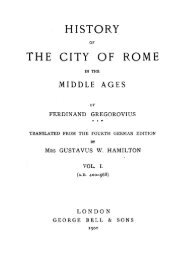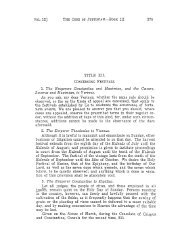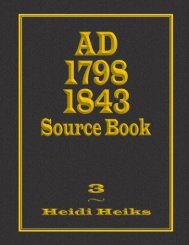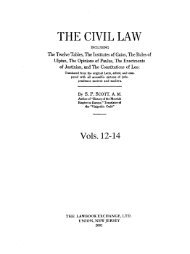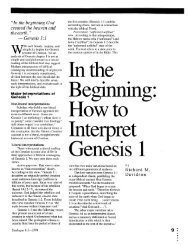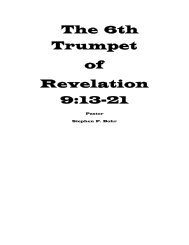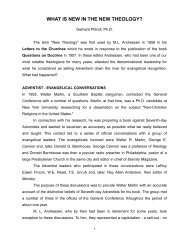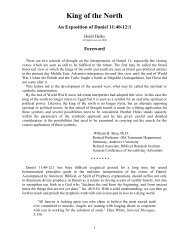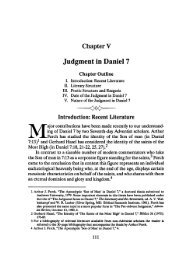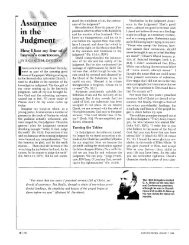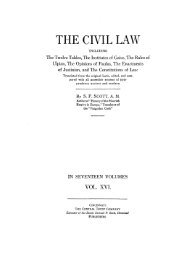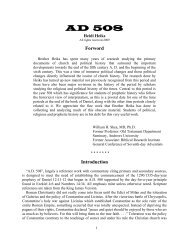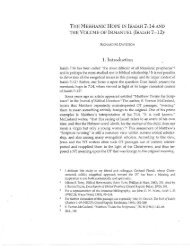FASTI ROMANI ROME AND CONSTANTINOPLE
FASTI ROMANI ROME AND CONSTANTINOPLE
FASTI ROMANI ROME AND CONSTANTINOPLE
Create successful ePaper yourself
Turn your PDF publications into a flip-book with our unique Google optimized e-Paper software.
496 1249. Paulus solus<br />
B.V.Incert.<br />
Cassiod. Chron.<br />
Pasch. Cod. Just.<br />
see col. 3.<br />
P.C. Victoris M.<br />
Marcellin. Paulo<br />
solo cos.<br />
Augustatico suo<br />
dudum Anastasius<br />
militibus præstito<br />
donativum quoque<br />
hoc fratre consule<br />
tribuit.<br />
Anastasii 6 from III. Id. April.<br />
The fifth year of the Isaurian war is marked by Theoforus Lector p.559 A the war having<br />
lasted for five years and Anastasius being tired Eupfemius, CP bishop hoped that peace<br />
is approaching etc.-However, Anastasius moved against the Isaurians like a king and<br />
defeated them decisively, and he sent to Euphemius and he announces him etc.<br />
Theophanes p.119 C 120 A places the reference to Ruphemius in the 4 th of Anastasius: at<br />
this year-the king being tired etc. and the defeat of the Isauruans in the 5 th of Anastasius:<br />
p.120B at this year Joannes the Scythian was besieging, he captured the magister<br />
Longinus from Selinus and Athenodorus and the rest of the tyrants; and after he<br />
decapitated them he sent their head to Byzantium to the king Anastasius. And<br />
Anastasius placed the heads of the tyrants on horses-he showed them to everybody.-He<br />
announced to the bishop Eypemius by the magister Eusebius etc. But the war was not<br />
ended till 499: conf.a. Euphemius was deposed in 4596: see col. 4. We must therefore<br />
suppose that the Isaurian leaders were repulsed in 496 and that Anastasius spoke only of<br />
this apud Theod. Lect. P.559 B Theophanem p.120 p.120 C, but that the leaders were taken<br />
after the exile of Euphemius<br />
Victory of Clovis: Greg. Tur. H.Fr.II.30 Bellum contra Alamannos comvoretur.-Facturm<br />
ets autem ut confligente utroque exercitu vehemwenter coderentur, atque exercitus<br />
Chlorovechi valde ad internecionem ruere cœpit. Quod ille videns, elevates ad cælum<br />
oculis, compunctus corde commotus in lacrymis ait “Jesu Christe,-si mili victoriam super<br />
hos hostes indulseris, et expertus fuero illam virtutem quam de te populus tuo nomini<br />
dicatus probasse se prædicat, credam tibi et in nomine tuo baptizer.” &c.-Cumque hæc<br />
diceret, Alamanni terga vertentes in fugam labi cœperunt, cumque regem sum cernerent<br />
intermtum, Chlorovechi se ditionibus subdunt.-at ille prohibito bello coartato que populo<br />
cum pace regressus narravit reginæ qualiter per invocationem nominis Christi victoriam<br />
meruit obtinere. (Actum anno XV o regni sui). These last words according to the editor are<br />
absent from many MSS. but are inserted (alia manu) in two copies. This date is alos<br />
inserted in two MSS. in II.37, although at the wrong place; for it refers not to be the war<br />
with Alaric but to the war with the Alamanni there mentioned. And we may transpose the<br />
passage in II.37 and read thus: pugnans contra Alamannos apud Tulbiacense oppidum<br />
anno XV o Chlorovechi.The baptism of Chlovis followed: Greg. Tur.II.31. On Christmasday:<br />
Aviti epistola. And, as the victory was shortly followed by the baptism Dec. 25, it<br />
must be referred to the autumn. The 15 th year of Chlovis Commenced in the beginning of<br />
A.D.496 because the 30 th year commenced in the beginning of A.D.511: conf.a.511.2.4.<br />
And these events in the 15 th year of his reign are determined to the autumn and to<br />
December of A.D.496.<br />
The letter of Avitus is quoted by Ruinart in Append. Ad Greg. Tur.p.1322: Aviti<br />
Viennensis episcope epistola ad Chlodo veum regem. Occiduis paribus in rege non novo<br />
novi jubaris limen effulgurat, cujus splendorem congrue Redemptoris nostril nativitas<br />
inchoaavit; ut consequenter eo die ad salutem regerari ex unda vos pareat quo natum<br />
redemptioni suæ cæli Dominum sit et vestry-in quo vos animam Deo vitam præsentibus<br />
famam posteris consecrastis. We may suppose that the epistle was written in January<br />
A.D.497.<br />
<strong>ROMANI</strong> 713<br />
3 SECULAR AUTHORS ECCLESIASTICAL AUTHORS<br />
Gelasii Ep. 13 apud Acta Concil. tom.5 p.324-327<br />
Universis episcopis per Dardaniam constitutes Gelasius.<br />
Datum Kal. Feb. Victore V.C. cos. Victore is an error of the<br />
transcriber.



